The daily business briefing: November 22, 2016
Markets hit record highs, Trump vows to quit Trans-Pacific Partnership on first day in office, and more
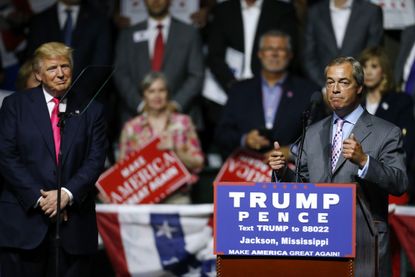
- 1. Markets close at record highs
- 2. Trump vows to scrap Trans-Pacific Partnership trade deal on first day in office
- 3. Argentina denies Trump sought business favors in call
- 4. Tyson Foods stock plunges after CEO announces departure
- 5. Trump suggests U.K. make Brexit champion Farage ambassador to U.S.

1. Markets close at record highs
All three of the main U.S. stock indexes extended a post-election rally to close at record highs on Monday, the first time that has happened since summer. The Dow Jones Industrial Average rose 0.47 percent, the Nasdaq Composite Index jumped 0.89 percent, and the S&P 500 Index advanced 0.75 percent, all setting intraday and closing records. Stock futures gained overnight, pointing to fresh records on Tuesday. The surge followed a rise in oil prices as OPEC appeared to near a deal to lower production. "I don't know if it will happen, but the market certainly hopes that it will," Robert Pavlik, chief market strategist at Boston Private Wealth, told CNBC about the pending deal. The markets also saw a jump in technology, led by Facebook.
2. Trump vows to scrap Trans-Pacific Partnership trade deal on first day in office
President-elect Donald Trump released a video Monday listing six things he would do on his first day in office in January "to restore our laws and bring back our jobs." Trump said the U.S. would quit the Trans-Pacific Partnership trade deal, a 12-nation pact he called a "potential disaster for our country." He also promised executive actions canceling "job-killing" restrictions on "shale energy" (i.e. fracking) and "clean coal," reducing federal regulations, investigating visa abuses that "undercut the American worker," improving cybersecurity, and imposing restrictions on lobbying by former government officials. New Zealand Prime Minister John Key said Tuesday that he was "a bit disappointed" about Trump's decision to scrap the TPP trade deal.
Subscribe to The Week
Escape your echo chamber. Get the facts behind the news, plus analysis from multiple perspectives.

Sign up for The Week's Free Newsletters
From our morning news briefing to a weekly Good News Newsletter, get the best of The Week delivered directly to your inbox.
From our morning news briefing to a weekly Good News Newsletter, get the best of The Week delivered directly to your inbox.
3. Argentina denies Trump sought business favors in call
Both President-elect Donald Trump and the government of Argentina on Monday denied a report that when Argentine President Mauricio Macri called to congratulate Trump on his election, Trump asked for help getting permits for a stalled office-building project in Buenos Aires. The report came from Jorge Lanata, a prominent journalist at one of Argentina's most prestigious daily newspapers, La Nacion. "It wasn't just a geopolitical chat," Lanata said in a TV appearance. The report surfaced after numerous critics called for clearer separation from Trump's duties as incoming president and his business interests. Trump has said his children will handle his companies independent of him, but The Wall Street Journal editorial page has urged him to liquidate his holdings.
The Washington Post Talking Points Memo
4. Tyson Foods stock plunges after CEO announces departure
Tyson Foods shares fell by more than 14 percent on Monday after the company forecast lower-than-expected 2017 profit, and announced that Chief Executive Donnie Smith planned to step down on Dec. 31. His departure surprised some on Wall Street, where he was regarded as a successful CEO. Tyson, the nation's largest meat processor, said that President Tom Hayes would replace Smith, who has been in the job for seven years. The news came as the company reported quarterly earnings that fell short of expectations. Tyson shares had risen 26 percent on the year as of Friday.
5. Trump suggests U.K. make Brexit champion Farage ambassador to U.S.
President-elect Donald Trump suggested that the British government should appoint Nigel Farage, a leading Brexit proponent who made a campaign appearance backing Trump, as the country's ambassador to the U.S. Trump's message, which he posted on Twitter, came as Prime Minister Theresa May's government was reaching out to him to reaffirm the "special relationship" between the U.S. and the U.K. It was also a departure from diplomatic protocol for Trump to publicly suggest that Britain appoint one of his allies as its U.S. envoy, especially since Farage is a right-wing rival to May's Conservative Party. May's office rejected Trump's suggestion, saying the job was already filled.
Sign up for Today's Best Articles in your inbox
A free daily email with the biggest news stories of the day – and the best features from TheWeek.com
Harold Maass is a contributing editor at The Week. He has been writing for The Week since the 2001 debut of the U.S. print edition and served as editor of TheWeek.com when it launched in 2008. Harold started his career as a newspaper reporter in South Florida and Haiti. He has previously worked for a variety of news outlets, including The Miami Herald, ABC News and Fox News, and for several years wrote a daily roundup of financial news for The Week and Yahoo Finance.
-
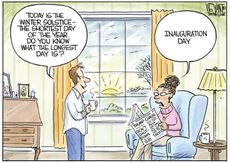 Today's political cartoons - December 22, 2024
Today's political cartoons - December 22, 2024Cartoons Sunday's cartoons - the long and short of it, trigger finger, and more
By The Week US Published
-
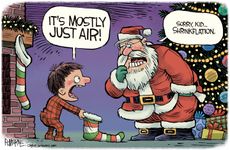 5 hilariously spirited cartoons about the spirit of Christmas
5 hilariously spirited cartoons about the spirit of ChristmasCartoons Artists take on excuses, pardons, and more
By The Week US Published
-
 Inside the house of Assad
Inside the house of AssadThe Explainer Bashar al-Assad and his father, Hafez, ruled Syria for more than half a century but how did one family achieve and maintain power?
By The Week UK Published
-
 Why Assad fell so fast
Why Assad fell so fastThe Explainer The newly liberated Syria is in an incredibly precarious position, but it's too soon to succumb to defeatist gloom
By The Week UK Published
-
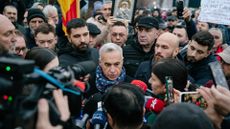 Romania's election rerun
Romania's election rerunThe Explainer Shock result of presidential election has been annulled following allegations of Russian interference
By Sorcha Bradley, The Week UK Published
-
 Russia's shadow war in Europe
Russia's shadow war in EuropeTalking Point Steering clear of open conflict, Moscow is slowly ratcheting up the pressure on Nato rivals to see what it can get away with.
By The Week UK Published
-
 Cutting cables: the war being waged under the sea
Cutting cables: the war being waged under the seaIn the Spotlight Two undersea cables were cut in the Baltic sea, sparking concern for the global network
By The Week UK Published
-
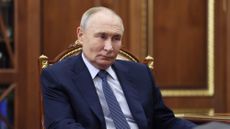 The nuclear threat: is Vladimir Putin bluffing?
The nuclear threat: is Vladimir Putin bluffing?Talking Point Kremlin's newest ballistic missile has some worried for Nato nations
By The Week UK Published
-
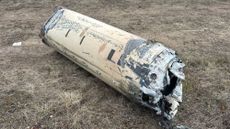 Russia vows retaliation for Ukrainian missile strikes
Russia vows retaliation for Ukrainian missile strikesSpeed Read Ukraine's forces have been using U.S.-supplied, long-range ATCMS missiles to hit Russia
By Arion McNicoll, The Week UK Published
-
 Has the Taliban banned women from speaking?
Has the Taliban banned women from speaking?Today's Big Question 'Rambling' message about 'bizarre' restriction joins series of recent decrees that amount to silencing of Afghanistan's women
By Harriet Marsden, The Week UK Published
-
 Cuba's energy crisis
Cuba's energy crisisThe Explainer Already beset by a host of issues, the island nation is struggling with nationwide blackouts
By Rebekah Evans, The Week UK Published